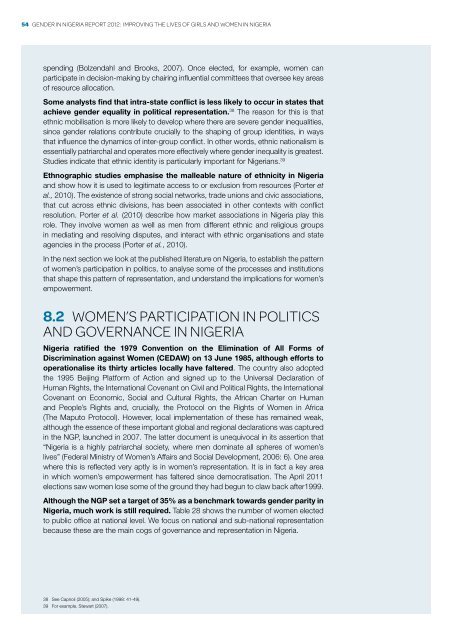Gender in niGeria report 2012 - Economic Commission for Africa
Gender in niGeria report 2012 - Economic Commission for Africa
Gender in niGeria report 2012 - Economic Commission for Africa
Create successful ePaper yourself
Turn your PDF publications into a flip-book with our unique Google optimized e-Paper software.
54 <strong>Gender</strong> <strong>in</strong> Nigeria Report <strong>2012</strong>: Improv<strong>in</strong>g the Lives of Girls and Women <strong>in</strong> Nigeria<br />
spend<strong>in</strong>g (Bolzendahl and Brooks, 2007). Once elected, <strong>for</strong> example, women can<br />
participate <strong>in</strong> decision-mak<strong>in</strong>g by chair<strong>in</strong>g <strong>in</strong>fluential committees that oversee key areas<br />
of resource allocation.<br />
Some analysts f<strong>in</strong>d that <strong>in</strong>tra-state conflict is less likely to occur <strong>in</strong> states that<br />
achieve gender equality <strong>in</strong> political representation. 38 The reason <strong>for</strong> this is that<br />
ethnic mobilisation is more likely to develop where there are severe gender <strong>in</strong>equalities,<br />
s<strong>in</strong>ce gender relations contribute crucially to the shap<strong>in</strong>g of group identities, <strong>in</strong> ways<br />
that <strong>in</strong>fluence the dynamics of <strong>in</strong>ter-group conflict. In other words, ethnic nationalism is<br />
essentially patriarchal and operates more effectively where gender <strong>in</strong>equality is greatest.<br />
Studies <strong>in</strong>dicate that ethnic identity is particularly important <strong>for</strong> Nigerians. 39<br />
Ethnographic studies emphasise the malleable nature of ethnicity <strong>in</strong> Nigeria<br />
and show how it is used to legitimate access to or exclusion from resources (Porter et<br />
al., 2010). The existence of strong social networks, trade unions and civic associations,<br />
that cut across ethnic divisions, has been associated <strong>in</strong> other contexts with conflict<br />
resolution. Porter et al. (2010) describe how market associations <strong>in</strong> Nigeria play this<br />
role. They <strong>in</strong>volve women as well as men from different ethnic and religious groups<br />
<strong>in</strong> mediat<strong>in</strong>g and resolv<strong>in</strong>g disputes, and <strong>in</strong>teract with ethnic organisations and state<br />
agencies <strong>in</strong> the process (Porter et al., 2010).<br />
In the next section we look at the published literature on Nigeria, to establish the pattern<br />
of women’s participation <strong>in</strong> politics, to analyse some of the processes and <strong>in</strong>stitutions<br />
that shape this pattern of representation, and understand the implications <strong>for</strong> women’s<br />
empowerment.<br />
8.2 Women’s participation <strong>in</strong> politics<br />
and governance <strong>in</strong> Nigeria<br />
Nigeria ratified the 1979 Convention on the Elim<strong>in</strong>ation of All Forms of<br />
Discrim<strong>in</strong>ation aga<strong>in</strong>st Women (CEDAW) on 13 June 1985, although ef<strong>for</strong>ts to<br />
operationalise its thirty articles locally have faltered. The country also adopted<br />
the 1995 Beij<strong>in</strong>g Plat<strong>for</strong>m of Action and signed up to the Universal Declaration of<br />
Human Rights, the International Covenant on Civil and Political Rights, the International<br />
Covenant on <strong>Economic</strong>, Social and Cultural Rights, the <strong>Africa</strong>n Charter on Human<br />
and People’s Rights and, crucially, the Protocol on the Rights of Women <strong>in</strong> <strong>Africa</strong><br />
(The Maputo Protocol). However, local implementation of these has rema<strong>in</strong>ed weak,<br />
although the essence of these important global and regional declarations was captured<br />
<strong>in</strong> the NGP, launched <strong>in</strong> 2007. The latter document is unequivocal <strong>in</strong> its assertion that<br />
“Nigeria is a highly patriarchal society, where men dom<strong>in</strong>ate all spheres of women’s<br />
lives” (Federal M<strong>in</strong>istry of Women’s Affairs and Social Development, 2006: 6). One area<br />
where this is reflected very aptly is <strong>in</strong> women’s representation. It is <strong>in</strong> fact a key area<br />
<strong>in</strong> which women’s empowerment has faltered s<strong>in</strong>ce democratisation. The April 2011<br />
elections saw women lose some of the ground they had begun to claw back after1999.<br />
Although the NGP set a target of 35% as a benchmark towards gender parity <strong>in</strong><br />
Nigeria, much work is still required. Table 28 shows the number of women elected<br />
to public office at national level. We focus on national and sub-national representation<br />
because these are the ma<strong>in</strong> cogs of governance and representation <strong>in</strong> Nigeria.<br />
38 See Caprioli (2005); and Spike (1998: 41-49).<br />
39 For example, Stewart (2007).

















